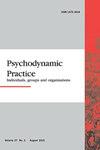编辑29 (2)
IF 0.4
Q4 PSYCHOLOGY, CLINICAL
引用次数: 0
摘要
我们发现自己,系统地和个人地,生活在复杂和充满挑战的时代,这对我们解决和管理当代问题的能力提出了越来越高的要求,但也为我们提供了评估和回顾以前理所当然的做事方式的机会。这同样适用于我们在一个不断变化的世界中每天面临的专业问题。本期的论文提出了一些发人深省的挑战,探讨我们如何面对要求越来越高的新的内外世界。我们以Farhad Dalal的演讲“它不在瓶子里:研究,伦理和心理治疗”开始这一期。一段时间以来,我们一直受到循证专业概念的束缚,这给我们的专业强加了一种离散的格式(如果不是结构的话),并需要确保我们的干预符合构成证据基础的框架。达拉尔认为,我们一直在寻求“实证主义者的证书,以便成为实证主义科学学院中受人尊敬的成员”。Dalal令人信服地指出,这些“实证主义方法论即使在原则上也无法捕捉人类交流的复杂性”,而人类交流是加工疗法的基础。我们一直面临着一个二元选择:客观知识vs主观经验;有形的和无形的。对于实证主义者和证据基础的基础来说,“如果某物(不能)被观察和测量,那么就没有证据证明它存在. . . . . .。只有可以计算的才算,不能计算的才算。”它提出了一个问题,即证据基础的概念是否“扭曲了现实,而不是对现实的描述”。Dalal提出了一个有趣的问题,即动态疗法的基础——经验和过程能否在实证主义/循证框架内得到体现。他问道,我们怎么能用一种“清除了主观性”的方法来研究主观性呢?有趣的是,Dalal认为,通过实证主义协议,监管机构制定了有利于. . . .财政利益的标准而不是他们想要保护的公众。”利用心理学、精神病学和心理治疗,Dalal展示了“监管和立法捕获”如何成为我们的职业试图适应科学心理动力学实践模型的结果,2023年第29卷,第2期,97-100,http://dx.doi.org/10.1080/14753634.2023.2195302本文章由计算机程序翻译,如有差异,请以英文原文为准。
Editorial 29(2)
We find ourselves, systemically and personally, living through complex and challenging times which increasingly make demands on our ability to address and manage contemporary issues but also offer the opportunity for us to take stock and review previously taken for granted ways of doing things. This applies no less to professional issues which confront us daily in a world that is changing constantly. The papers in this issue offer some thought-provoking challenges as to how we might confront the new internal and external worlds that are becoming increasingly demanding. We begin this edition with Farhad Dalal’s talk ‘It’s not in the bottle: research, ethics & psychotherapy’. We have for some time been in thrall to the concept of being an evidence-based profession which has imposed a discrete format, if not structure, on our profession and a need to ensure that our interventions meet the framework of what constitutes an evidence base. We have, Dalal believes, sought ‘positivist credentials in order to become respectable members of the positivist scientific academy’. Dalal convincingly argues that these ‘positivist methodologies are unable, even in principle, to capture the intricacies of human exchange’ which are fundamental to processled therapies. We have been faced with a binary choice: objective knowledge versus subjective experience; the tangible versus the intangible. For positivists, and the foundation of an evidence base, ‘if something (cannot) be observed and measured then there (is) no proof that it exists . . . . . . only that which can be counted counts, and that which cannot be counted, is discounted’. It raises the question whether the notion of an evidence base is a ‘distortion of reality rather than a description of it’. Dalal intriguingly questions whether both experience and process, fundamental to the dynamic therapies, can be captured within a positivist/evidence-based framework. How can, he asks, we study the subjective using a method that has been ‘purged of subjectivity?’ Intriguingly, Dalal argues that, via positivist protocols, the regulators have set standards that favour the ‘fiscal interests of . . . . industry, rather than the public that they are meant to protect’. Using psychology, psychiatry, and psychotherapy, Dalal shows how ’regulatory and legislative capture’ have been a consequence of our profession attempting to fit into a model of scientific Psychodynamic Practice, 2023 Vol. 29, No. 2, 97–100, http://dx.doi.org/10.1080/14753634.2023.2195302
求助全文
通过发布文献求助,成功后即可免费获取论文全文。
去求助
来源期刊

Psychodynamic Practice
PSYCHOLOGY, PSYCHOANALYSIS-
CiteScore
0.90
自引率
0.00%
发文量
41
期刊介绍:
Psychodynamic Practice is a journal of counselling, psychotherapy and consultancy and it is written for professionals in all fields who use psychodynamic thinking in their work. The journal explores the relevance of psychodynamic ideas to different occupational settings. It emphasizes setting and application as well as theory and technique and focuses on four broad areas: •Clinical practice •The understanding of group and organisational processes •The use of psychodynamic ideas and methods in different occupational settings (for example, education and training, health care, social work, pastoral care, management and consultancy) •The understanding of social, political and cultural issues
 求助内容:
求助内容: 应助结果提醒方式:
应助结果提醒方式:


